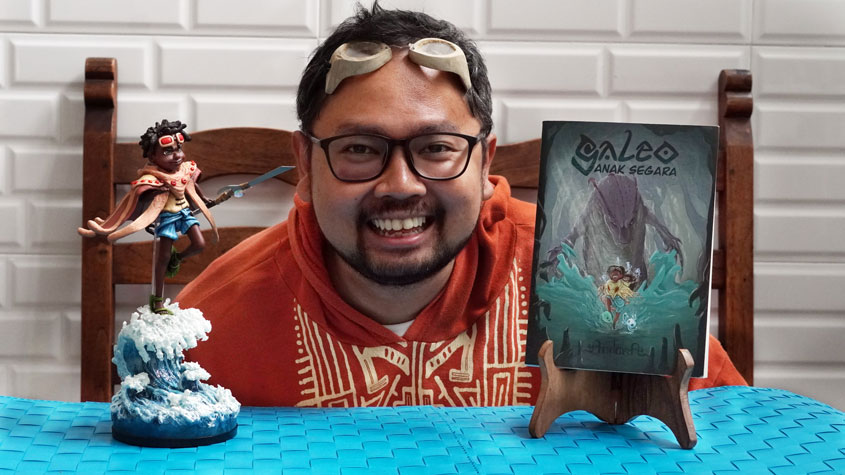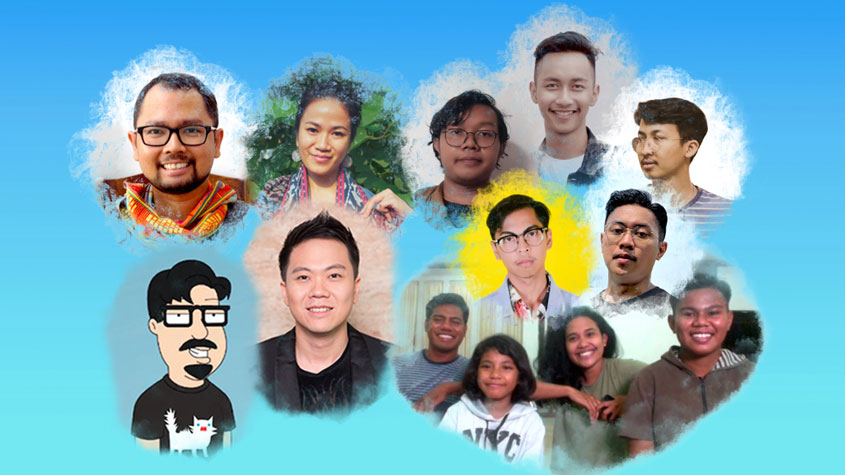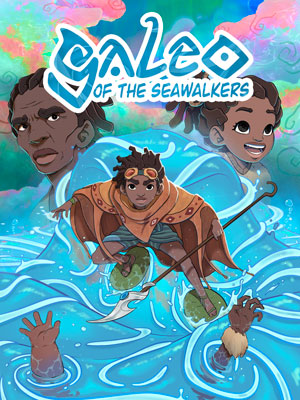Young film director’s drive to promote Indonesian culture
Young Indonesian filmmaker and writer Andara (Andra) Fembriarto is passionate about showcasing Indonesia’s cultural heritage on screen. For the last ten years, he has focused his creative talents on developing a wide range of educational and entertainment web series, films and novels that celebrate Indonesia’s rich cultural heritage.

Growing up in the world’s biggest archipelago, Fembriarto soon learned that his ancestors were seafarers. This awakened a personal desire to connect with his maritime roots and the traditions and spirituality of Indonesia’s maritime communities.
After touring various coastal villages on the islands of Wakatobi (Bajo Mola) and Lembata (Lamelera) during a work trip, he drew inspiration from what he had seen and experienced and set about writing a fantasy novel, Galeo of The Seawalkers (Galeo Anak Segara).
The novel traces the personal dramas and conflicts that affect the lives of his imaginary Seawalkers community. It recounts the story of Galeo, a young fisher boy who has the ability to walk on water but is terrified of the sea’s dangers. When his little sister runs away from home to chase the sea ghosts, which she believes will lead her to their missing father, Galeo has no choice but to overcome his fears and go after her.
Fembriarto explains that references to Indonesian culture in the novel are allegorical. The novel echoes many Indonesian maritime traditions, including, for example, the rites of passage that take place at the sea and the importance of social gatherings. “I approached Galeo of The Seawalkers like The Lord of the Rings and Raya and The Last Dragon. I did not explicitly refer to any real life Indonesian communities, I simply drew inspiration from those communities and reflected their inherent values in my story,” he explains, noting that “many of the cultural inspirations for the novel can be found in the book’s appendix.”
Video: Andra Fembriarto was inspired to write Galeo of The Seawalkers by the Bajo Tribe, a nomadic sea tribe that lives on floating houses near the four Wakatobi islands in Southeast Sulawesi. Their motto, “Luma kami padi Laut”, means “Our home is on the sea”.
A story in different formats
Though Galeo of The Seawalkers is currently being adapted into an English language comic series, Fembriarto’s ambition has always been to express his novel through film. In 2021, with limited possibilities to travel for his work because of the COVID-19 pandemic, Fembriarto decided to turn his dream into reality and set about creating a short film animation called Splish Splash (Cipak Cipuk) based on his novel. The film tells the story of two siblings who have to fight pirates who try to steal their family’s precious Sun Pearl necklace.
“The story of Galeo of The Seawalkers has been swimming around in my imagination for over a decade. It is an achievement to bring it to life in the form of an animation,” he says, noting the story’s potential for development into a feature-length film or a long running TV series.
In making of Splish Splash, Andra brought together a team of creators from across Western and Eastern Indonesia to work on the project, which took around six months to complete. From storyboarding, character animation, and postproduction, Andra collaborated with animators from Malang in East Java, to Kupang in Timor via video calls.
“The collaboration to make Splish Splash was very special as none of the animators, voice actors, and producers, including myself, had ever met in person before. I was very lucky to have talented and professional artists by my side who were excited to participate in the project,” Fembriarto explains.
“I wanted to create an animated version of the novel and I could not be more grateful and thrilled about all the recognition and support my project has received,” he says.
Financial and logistical challenges
“The biggest challenge in making Splish Splash was securing financing,” Fembriarto explains, noting that the initial funds for the film came from his sister in Melbourne, Australia. “Studio Amarana wrote the script, storyboard and animation and ORRO Animation in Malang, East Java produced the animation. The sound design and music were created in Jakarta by Elwin Hendrijanto and Reyner Ferdinand, as well as post-production at Visi8 Studio,” Fembriarto notes.
Reflecting on one of the most memorable moments of the project, he recalls an incident when he was working with the Kupang Film Community via video call during post production. “I was working with Kupang Film Community via video call. I had to direct the voice talents, and unfortunately, there was a power cut that day, so the actors had to read the dialogue in a darkened studio lit by mobile phones and a laptop screen.”

Since completion, Splish Splash has made its way to numerous film festivals and workshops around the world, including the 2021 ReelOzInd Australia Indonesia Short Film Festival, in Australia, the 2021 Vancouver Asian Film Festival in Canada, as well as the 2021 AnimaFilm International Animation Festival, in Azerbaijan.
Splish Splash won the award for Best Short Animation at the 2022 Piala Maya Festival in Indonesia. Currently, the film is being used as a teaching material for Indonesian language and culture studies in several schools in Melbourne, Australia.
Film animation in Indonesia and IP rights
Although the COVID-19 pandemic has slowed the growth of the Indonesian film industry, it is recovering well and a new generation of filmmakers is growing up, telling their own stories. As for country’s film animation sector, it is still in its infancy and despite a lack of funding and experienced animators, Andra is upbeat about its future. “Fortunately, animated short films are on the rise and growing healthily thanks to social media, and Splish Splash is contributing to this expansion,” he says.
Thanks to a government-backed program, Fembriarto was able to learn about the benefits of IP for creators. “Luckily, in Indonesia, there is a government backed IP Workshop called Katapel ID that is helping Indonesian creators in developing a business mindset for their IPs,” he explains. On the basis of that training he recognized the importance of registering his novel with the Indonesian Directorate General of Intellectual Property.
In most countries, copyright protection is obtained automatically without the need for registration or other formalities in line with the Berne Convention for the Protection of Literary and Artistic Works. However, in a large number of countries, including Indonesia, there is a system in place to allow for the voluntary registration of creative works. Such systems can help create reliable proof of creation and ownership, avoid potential disputes, and facilitate financial transactions, sales, and the assignment and/or transfer of rights.

to a comic book series.
(Photo: Courtesy of Andra Fembriarto)
Future plans
Fembriarto plans to expand his short film (Splish Splash) into a comic book series and to make Galeo of The Seawalkers into a feature film. The feature film project that is based on the novel has already been presented at various film financing forums such as Akatara, in Indonesia, and the Holland Film Meeting, in The Netherlands. Visi8 Studio has bought the rights to make and distribute the Galeo of The Seawalkers comic. The company is working with veteran comic artist, Kevin VanHook as the story editor. The comic is slated for distribution in the United States in 2023. He also notes that “Galeo of The Seawalkers is open for licensing and other collaborations worldwide.”
Fembriarto sees his novel as a vehicle to promote Indonesian culture and to attract the interest of viewers around the world to explore his country. “This fantasy story can be a gateway for global audiences to become curious about Indonesia, just as films like The Lord of The Rings invited the world to explore New Zealand,” he says.
Andra Fembriarto is also known for creating the short films The Lightdancer (2017), Pohon Penghujan / The Raining Three (2013), and Sinema Purnama / Moonlight Cinema (2012).